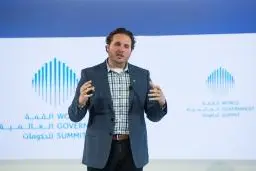PHOTO
Digital revolution in farming industry will fundamentally change global economy
Dubai-UAE: 13 February, 2017
The UAE imports 85 percent of its food at the cost of 15 percent of its GDP. Though this might be a scary thought, it is also an opportunity for this generation to make a real impact, said Caleb Harper on the second day of the World Government Summit 2017 in Dubai.
Harper is the Principal Investigator and Director of the Open Agriculture (OpenAG) Initiative at the MIT Media Lab that works with engineers, architects and scientists on research and development of future food systems.
Explaining the purpose of his work, he said: “At our lab we use a personal food computer which you can imagine as a kind of primitive 3D printer for food. Allowing scientists and researchers to test the effects that different climates can have on crops, the computer gives us access to an immense amount of knowledge, and has also proven to be a great educational tool. We have brought the computer into schools to show students the concrete effects that global warming will have on their future food supply.”
He added: “Today, about 80 percent of the world is food-insecure. This startling number is further aggravated by a complex food distribution system. We are seeing a change in consumer demands. While in the 1970s consumers were demanding cheaper food, today they are asking for better, more nutritious and sustainable food. This demand has led to plant factories that can grow up to one million heads of lettuce per week.”
Commenting on the outlook for such bio companies, Harper said: “We have seen a lot of these companies going bankrupt but this is because they are not fully integrated. In contrast, we have seen companies such as Tesla and Apple succeed because they have used open source to allow people to understand what they are doing, which then allows people to support and innovate. Ultimately, if bio companies do the same, they will succeed as well.”
The MIT Media Lab is developing an open‐source agricultural hardware, software and data common to create a collaborative food system. Thanks to open-sourcing, the lab has been able to expand its work onto six continents with minimal funding.
According to Harper, these innovations will have a major impact. He said: “The digital revolution that is currently taking place within the agricultural industry will, for example, allow cotton growers to grow their crops in controlled environments next to their mills and factories. This will fundamentally change the global economy.”
Concluding his talk with a call to action, Harper added: “Mechanical engineers, data scientists, biologists and other experts must work together to incorporate digital tools. The future of food will rely on the next one billion of farmers who come together to ask the question ‘what if?’”
The World Government Summit (WGS) 2017 has drawn the participation of more than 4,000 personalities from 139 countries around the world, reflecting the leading stature of the summit on regional and international levels and the high interest from governments, global organizations, private and public sector entities, decision makers, entrepreneurs, academics and university students as well as scientists and innovators. WGS 2017 features 150 speakers across 114 sessions that highlight the world’s most pressing challenges and showcase best practices and cutting-edge solutions to deal with them.
-Ends-
About World Government Summit
The World Government Summit is the primary global forum dedicated to shaping the future of governments worldwide. Each year, the summit sets the agenda for the next generation of governments with a focus on harnessing innovation and technology to solve universal challenges facing humanity. The World Government Summit is a knowledge exchange platform that converges governments, futurism, technology and innovation. It functions as a thought leadership and networking hub for policymakers, experts and pioneers in human development. As a gateway to the future, the summit analyzes trends, issues and opportunities that humanity is likely to face in the coming decades, while showcasing innovations, best practices and smart solutions that inspire creative ideas on how best to address them.
Contact
Name: Wael Hayatli
E-mail: whayatli@apcoworldwide.com
Mobile Number: +971 55 965 5728
© Press Release 2017




















